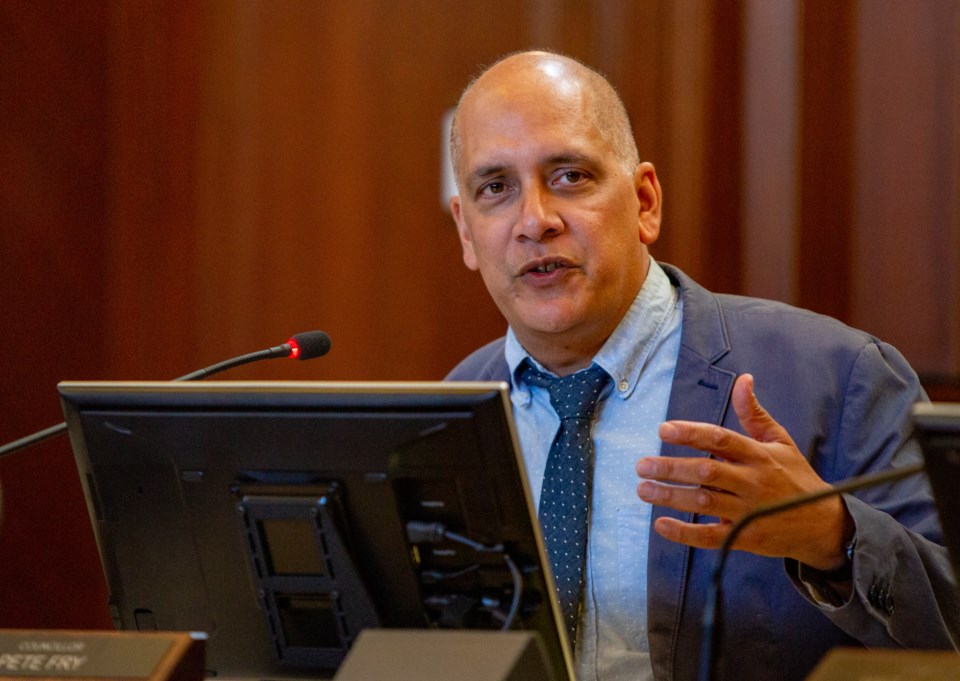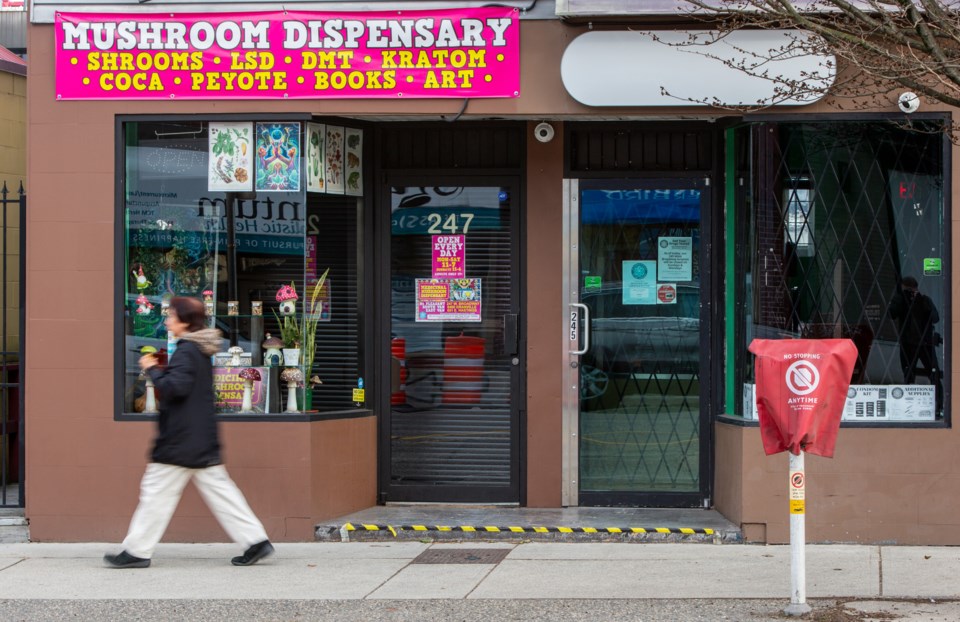Health Canada has sent a letter to Vancouver city manager Paul Mochrie over concerns that two Green Party councillors overturned a ruling of the city’s chief licence inspector to suspend the business licence of a magic mushroom dispensary.
The March 15 letter obtained by Glacier Media is authored by a Health Canada staff member on behalf of acting director general Carol Anne Chenard of the Controlled Substances and Opioid Response Directorate.
“It is important that psilocybin mushrooms are controlled under the Controlled Drugs and Substances Act [CDSA],” the letter says.
“Storefronts selling psilocybin to the general public are not authorized to do so under the CDSA and its regulations. Therefore, such storefronts may be subject to law enforcement action.”
The letter was in response to a 2-1 decision March 5 by council’s business licence review panel that overturned a recommendation of Sarah Hicks — the city’s chief licence inspector — and city lawyer Robert LeBlanc.
Hicks had suspended the business licence of the Medicinal Mushroom Dispensary at 247 West Broadway in May 2023. The panel heard that Valentin Muller had applied for a licence as a retailer of “gifts and novelties,” and was granted a business licence Jan. 1, 2023.
In March of that year, a city property use inspector visited the business and reported that illegal drugs, as defined under the federal Controlled Drugs and Substances Act, were being sold.
Despite the licence suspension, the store continues to operate, selling mushrooms, LSD, peyote, DMT, coca and kratom. The dispensary is located a couple of blocks from city hall and a short walk from the Vancouver Police Department’s Cambie Street precinct.
Police raids
In November 2023, police executed search warrants at the dispensary and two others on East Hastings Street and Granville Street. The panel heard police seized a total of 27 kilograms of psilocybin, 2.2 kilograms of coca leaf, 2.7 kilograms of LSD and one kilogram of DMT.
No charges were laid.
Although exemptions exist in British Columbia for people who possess and consume drugs for personal use, it is illegal to traffic psilocybin and other psychedelic drugs unless an exemption from Health Canada has been obtained, for example, for a clinical trial.
The letter from Health Canada to Mochrie points out that psilocybin is classified as a restricted drug under part J of the Food and Drug Regulations, meaning it cannot be sold to the general public.
“Even holders of a controlled substances dealer’s licence cannot sell psilocybin to the general public,” the letter says. “Health Canada maintains the position that illegally operating storefronts pose a risk to the health and safety of Canadians.”

Regulatory framework
The letter was mentioned by city councillors at a Wednesday council meeting, where the Green Party’s Adriane Carr and Pete Fry introduced a motion to have the city consider regulating business licences for retailers of psilocybin, peyote, mescaline, auyahuasca and kratom.
Carr and Fry formed the majority on the three-person business licence review panel that allowed the dispensary on West Broadway to continue operating with its current licence.
The councillors argued at the time — and again Wednesday — that the city had set up a retail framework in 2015 to regulate marijuana dispensaries before cannabis was made legal six years later by the federal government.
“Through a regulatory framework, we can prevent access to children and young people, we can have standards of retail that can inform how they're displayed, what kind of signage, the visibility, a location of retail outlets,” Fry said Wednesday.
“This regulatory framework is not about legalizing mushrooms or entheogens. Rather, it's just creating a regulatory framework for how businesses operate.”
More than a dozen citizens, including well-known drug legalization advocate Dana Larsen, spoke to council in support of the motion. Larsen is a director of the Strathcona Tea Society, a non-profit that handles the finances and logistics of the Broadway dispensary and two others in Vancouver.
Larsen also referred to the council-of-the-day’s move in 2015 to regulate marijuana dispensaries as a reason to do the same for mushroom dispensaries, which he estimated have grown to 24 in Vancouver.
“If council chooses not to pass this motion and to ignore the issue, it's only going to come up again and we're only going to see more and more of these kinds of stores opening,” he said.
'They save lives'
Ariel Konrad, an employee at the Medicinal Mushroom Dispensary and chemistry student at the University of B.C., told council that psilocybin, LSD and mescaline “do not endanger lives, they save lives.”
“I have firsthand seen the substances that we provide alleviate the symptoms of depression, anxiety, trauma, years of dependence on antidepressants, nicotine addiction, alcoholism and toxic marriage,” Konrad said.
“Some of my friends would have ended their lives — they would not be here with us — if it wasn't for the kind of work that we provide at the mushroom dispensaries.”
Mental health and addiction
Lawyer Kirk Tousaw, who acted on behalf of marijuana dispensaries prior to the city regulating them, recommended council read an article published in May 2023 in the International Journal of Mental Health and Addiction.
The article —“Changed substance use after psychedelic experiences among individuals in Canada” — was authored by an assistant professor and a researcher at University of Michigan, along with the president of a Victoria clinic group focused on providing psychedelic-assisted therapies for pain and mental health.
The authors conducted an online survey of 1,639 adults who self-reported past or current psychedelic use. The trio investigated whether psychedelic use was associated with self-reported changes in the use of other substances.
The results found that 44 per cent decreased or ceased alcohol use, 43 per cent ceased or decreased antidepressant use and 42 per cent decreased or ceased cocaine use, according to the article.
Overdose crisis
M.J. Milloy, an associate professor of medicine at UBC and research scientist at the British Columbia Centre on Substance Use, cautioned council about drawing parallels between marijuana and entheogens as alternatives to toxic drugs.
Milloy said he has studied overdose in the Downtown Eastside for 15 years and in 2017 focused his research on the potential of cannabis to serve as a beneficial intervention into the overdose crisis.
“This motion makes sort of an explicit parallel between cannabis and entheogens with respect to the overdose crisis,” he said.
“Unfortunately, scientifically, the evidence is not yet there to support the use of entheogens in this way, contrary to the findings we have seen so far with cannabis.”
'This is not our lane'
At the same time, he continued, that's not to say that the ideas are not plausible.
“Indeed, the recent clinical trials with entheogens have, in fact, demonstrated quite thrilling results with respect to using these substances as treatments for depression, anxiety, addiction, pain and trauma and the other things which underlay the overdose crisis,” he said.
“However, importantly, these molecules have not been demonstrated to be safe among people who use drugs at highest risk of overdose. And indeed, there may be interactions between these drugs.”
The ABC Vancouver majority defeated the Greens’ motion 5-2, with Coun. Brian Montague arguing the motion was an extension of the business licence review panel’s decision to allow the West Broadway dispensary to continue operating.
Montague, a retired Vancouver police officer, accused Carr and Fry of exploiting their positions as councillors and engaging in activism.
“This motion has absolutely no business being considered by municipal government,” he said.
“I'm not here to debate the merits or the harms of a potential product. I'm here to say that this is not our lane. This is not our jurisdiction. We shouldn't be touching with this with a 10-foot pole.”
Contact your local MP
ABC Coun. Lenny Zhou encouraged the citizens who spoke in favour of the Greens’ motion to advocate for change at a national level.
“I really appreciate your efforts in advocating for magic mushrooms these many years, especially for the clinical use,” Zhou said.
“I understand your good intention, but the city council is not the right table to be talking about this issue. So I really encourage you to contact your local member of Parliament and continue with the advocacy.”
Absent for the vote Wednesday were Mayor Ken Sim, Rebecca Bligh, Peter Meiszner and OneCity Coun. Christine Boyle.
Meanwhile, the city’s chief licence inspector has not said whether any legal action will be taken to appeal the business licence review panel’s decision March 5 to reject her recommendation to uphold the suspension of the dispensary’s licence.




